-
To regulate the importation of animals/plants and their products;
-
To facilitate the export of live animals, animal products, plants and plant products by providing a credible sanitary certification;
-
To assist in monitoring the trade of endangered species;
-
To regulate pesticides; and
-
To negotiate protocols for the importation and export of animals/plants and their products.
FARM LICENSING AND INSPECTIONS
Since the implementation of the Livestock Waste Control Scheme in 1994, all livestock farms must hold a Livestock Keeping Licence to continue keeping livestock. This requirement was introduced to control livestock waste pollution. The Livestock Keeping Licence stipulates that a farmer must install appropriate waste treatment facilities that meet minimum discharge standards. Livestock Keeping Licences also contain provisions relating to the protection of public health and include conditions relating to the control and prevention of animal diseases, such as avian influenza.
All livestock farms are inspected regularly, particularly those suspected of discharging waste illegally or where waste treatment practices have caused a nuisance to surrounding communities. Action is also taken against farmers who keep livestock illegally.
New biosecurity requirements have recently been enhanced to reduce the risk of a highly pathogenic avian influenza outbreak occurring on local farms. Additional measures for poultry farms include:
-
Installing bird-proof facilities;
-
Requiring all new poultry farms to be at least 500 metres apart from existing poultry farms;
-
Prohibiting the presence of transport cages from wholesale/retail markets on a farm; and
-
Requiring local day-old chicks to be introduced from recognised hatcheries.
In April 2002, a one-year vaccination trial was also undertaken to assess the effectiveness of an inactivated vaccine for halting and preventing infection in the face of an avian influenza outbreak. Based on the satisfactory result of the vaccination trial, a universal compulsory vaccination programme against avian influenza was implemented at all local chicken farms as of June 1, 2003.
During the 2005-06 period, 33 written warnings were issued to licensed farmers, eight prosecutions were made for illegal keeping of livestock and one Livestock Keeping Licence was revoked for violation of licence conditions.
VOLUNTARY SURRENDER SCHEME
The latest series of avian influenza outbreaks that started in Southeast Asia in early 2004 indicate that the avian influenza viruses are becoming more pathogenic and causing higher fatality. In light of this development and with regard to recent studies and warnings from the World Health Organization, the Government announced on March 14, 2005 a comprehensive plan of action to reduce the risk of avian influenza outbreaks in Hong Kong.
To implement this plan, which deals with the increasingly global and serious threat of avian influenza, a number of fundamental changes must occur in the existing modus operandi of the live poultry farm, wholesale and transport industries. As part of these changes, a voluntary surrender package was introduced on August 5, 2005 enabling live poultry farmers, wholesalers and transporters to receive an ex-gratia payment (EGP) in exchange for surrendering their licences/tenancies and ceasing operation on a permanent basis.
During the 2005-06 period, 77 applications from farmers (38 chicken, 34 pigeon and five duck farmers) as well as 13 applications from wholesalers were received for EGP, and six applications (three from farms and three from wholesale workers) for a One-Off Grant. Some 28 Livestock Keeping Licences and 11 tenancies were surrendered under the Scheme.
VETERINARY DIAGNOSTIC LABORATORY
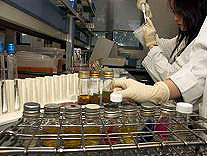 The highly pathogenic H5N1 avian influenza virus continued to be a major public health concern globally in 2005, particularly in neighbouring Asian regions where cases of H5N1 infections in poultry, wild birds and humans were reported on a monthly basis. Throughout the year, the Department continued to monitor for the presence of avian influenza in birds and poultry at various risk levels, including local poultry farms, imported poultry, wholesale markets, retail markets, imported pet birds, pet shops, recreational parks and wild birds. The highly pathogenic H5N1 avian influenza virus continued to be a major public health concern globally in 2005, particularly in neighbouring Asian regions where cases of H5N1 infections in poultry, wild birds and humans were reported on a monthly basis. Throughout the year, the Department continued to monitor for the presence of avian influenza in birds and poultry at various risk levels, including local poultry farms, imported poultry, wholesale markets, retail markets, imported pet birds, pet shops, recreational parks and wild birds.
Since October 2005, a new monitoring system with an emphasis on the surveillance of avian influenza in wild birds has been in place for handling debilitated and dead birds in all regions of Hong Kong. Wild birds are collected and tested daily with timely screening and confirmatory results reported within days. Over 6 000 wild birds were identified and tested in five months, resulting in 17 cases of H5N1 infection confirmed in 15 dead wild birds and two abandoned chickens. Despite these findings, the estimated infection rate was not significantly higher than in previous years.
There was also increased demand for monitoring other animal diseases and chemical residues in food animals, and for supporting the health certification of export animals. As a result, more tests were requested and additional laboratory methods were evaluated. Through our testing programs, the number of potentially tainted pork cases withheld from slaughtering was maintained at a low level. In the same period, the number of aquatic animal consignments for export requiring laboratory testing increased by over 250%.
CONTROL OF PESTICIDES
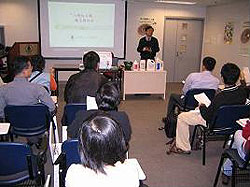 The Department continued to provide technical support to pest control companies and various government departments on the safe and proper use of pesticides for the control of the Red Imported Fire Ant (RIFA). Technical workshops on RIFA control were also organised for all concerned stakeholders. Three new RIFA baits with low mammalian toxicities were registered by the Department to provide a wider and better choice of RIFA pesticides to the pest-control industry. The Department continued to provide technical support to pest control companies and various government departments on the safe and proper use of pesticides for the control of the Red Imported Fire Ant (RIFA). Technical workshops on RIFA control were also organised for all concerned stakeholders. Three new RIFA baits with low mammalian toxicities were registered by the Department to provide a wider and better choice of RIFA pesticides to the pest-control industry.
Due to increasing public awareness of the spread of mosquito-borne diseases, the Department continued to provide technical talks to educate the public and government departments on the safe use of pesticides in mosquito control. In addition, the Department and the Food and Environmental Hygiene Department jointly published a booklet entitled Rodent Control Guide for Pest Control Personnel to provide technical guidelines to the pest-control industry on the integrated pest management of rodents as well as on the safe and proper use of rodenticides.
Three insect pheromones viz ferrolure+, rhyncolure and disparlure were registered to facilitate the monitoring of globally important plant-quarantine insect pests. This was in response to increasing concerns over the risk of exotic pest introductions associated with plant imports and the growing need to strengthen the required pest surveillance..
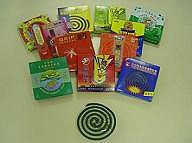 An unregistered pesticide active ingredient, Octachlorodipropylether (S-2), was detected in 11 brands of mosquito coil in a market survey. As S-2-containing mosquito coils are not registered under the Pesticides Ordinance, suppliers were requested to recall these products from the local market. Prompt recall actions were implemented and monitoring of mosquito products at the supply as well as retail level was conducted. New S2-free mosquito coil products were successfully introduced as replacements. An unregistered pesticide active ingredient, Octachlorodipropylether (S-2), was detected in 11 brands of mosquito coil in a market survey. As S-2-containing mosquito coils are not registered under the Pesticides Ordinance, suppliers were requested to recall these products from the local market. Prompt recall actions were implemented and monitoring of mosquito products at the supply as well as retail level was conducted. New S2-free mosquito coil products were successfully introduced as replacements.
On the global scene, China has ratified two international conventions for the regulation of hazardous pesticides, namely the Stockholm Convention and the Rotterdam Convention in 2004 and 2005 respectively. To join the concerted global effort to govern the trading and production of these pesticides, we plan to revise the Pesticides Ordinance to cover new provisions that fulfil the HKSAR’s obligations under the two conventions. Together with the previously proposed legislative amendments relating to pesticide user control and product registration, the Pesticides (Amendment) Bill has been scheduled for introduction to the Legislative Council in mid 2007.
Statistics on pesticides control are shown in Appendix 8.
PLANT QUARANTINE CONTROL
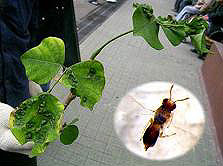 Since the detection of the Red Imported Fire Ant (RIFA), Solenopsis invicta, in Hong Kong in 2005, all related government departments have worked jointly to control RIFA populations discovered in premises under their management. During the year, the Department continued to provide technical advice to all concerned parties on RIFA control and specimen identification, as well as publicising information on RIFA through the Internet, leaflets and posters. To keep abreast of the latest control measures, the Department also attended an overseas RIFA conference. Locally, technical workshops were organised to educate local pest-control companies and government departments on RIFA and appropriate control measures. Likewise, communication with Mainland quarantine authorities was enhanced and border inspections stepped up to prevent the entry of this pest through plants with soil imported from Mainland China. Since the detection of the Red Imported Fire Ant (RIFA), Solenopsis invicta, in Hong Kong in 2005, all related government departments have worked jointly to control RIFA populations discovered in premises under their management. During the year, the Department continued to provide technical advice to all concerned parties on RIFA control and specimen identification, as well as publicising information on RIFA through the Internet, leaflets and posters. To keep abreast of the latest control measures, the Department also attended an overseas RIFA conference. Locally, technical workshops were organised to educate local pest-control companies and government departments on RIFA and appropriate control measures. Likewise, communication with Mainland quarantine authorities was enhanced and border inspections stepped up to prevent the entry of this pest through plants with soil imported from Mainland China.
The Erythrina Gall Wasp, Quadrastichus erythrinae Kim, has been responsible for the severe defoliation and even death of Coral trees in many overseas countries in the past few years. In August 2005, this pest was first reported in Shenzhen and Mainland China immediately listed it as an important quarantine pest. To combat this pest and prevent its spread in Hong Kong, the Department issued a pest alert to local plant traders, nurseries, the landscaping industry, property management companies and government departments. Assiduous efforts were also made to eradicate and control the pest in infested locations, including a theme park, government nurseries and a number of parks. To complement these efforts, experts from Mainland China were invited to advise on control measures, which ultimately proved effective.
China became a party to the International Plant Protection Convention in October 2005. This means the plant quarantine law of Hong Kong, which has been in use since 1976, must be brought in line with the convention’s requirement before the convention can be extended to the HKSAR. The Department initiated this process by inviting the Chinese Academy of Inspection and Quarantine of the General Administration of Quality Supervision, Inspection and Quarantine of China to conduct a project on pest risk analysis in March 2005. The project will be completed in 2007.
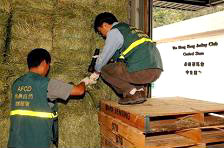 To ensure the importation of horse feed and bedding materials takes place in an orderly fashion for the 2008 Olympics Equestrian Events and does not bring new pest problems into Hong Kong, discussions have already begun with a number of stakeholders. These include the Equestrian Events (Hong Kong) of the Games of the XXIX Olympiad Company Limited, the Hong Kong Jockey Club and the official transportation agent. As a result, detailed importation guidelines have been produced for all competing teams. To ensure the importation of horse feed and bedding materials takes place in an orderly fashion for the 2008 Olympics Equestrian Events and does not bring new pest problems into Hong Kong, discussions have already begun with a number of stakeholders. These include the Equestrian Events (Hong Kong) of the Games of the XXIX Olympiad Company Limited, the Hong Kong Jockey Club and the official transportation agent. As a result, detailed importation guidelines have been produced for all competing teams.
Statistics on plant import controls and phytosanitary certification services are shown in Appendix 7.
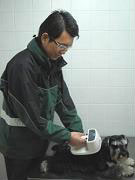 NEW MICROCHIP REQUIREMENT FOR IMPORTED DOGS AND CATS NEW MICROCHIP REQUIREMENT FOR IMPORTED DOGS AND CATS
To continue improving the Department’s role in regulating the import of animals, a new measure came into operation for the importation of dogs and cats. An additional term in the Special (Import) Permit stipulates that all dogs and cats must be implanted with a microchip before arrival into Hong Kong. The type and number of the microchip is to be recorded on the animal health certificate which accompanies the pet to Hong Kong. As the microchip number acts like a fingerprint of the animal, it ensures the animal imported into Hong Kong is the same as the pet listed on the accompanying documents, thus avoiding confusion with another pet with the same characteristics, mismatching of health certificates and other importation documents. This system also allows the Department to easily confirm that the pet has been imported legally and provides a mechanism for more effective animal disease surveillance, thus better protecting Hong Kong.
2008 OLYMPIC AND PARALYMPIC EQUESTRIAN EVENTS
The Games of the XXIX Olympiad will be hosted in Beijing, China, in 2008. The Government of the HKSAR will assist in staging the Equestrian Events for both the Olympic and Paralympic Games in Hong Kong.
The AFCD is the inspection and quarantine authority for all animals in Hong Kong. As such, the Department has the legislative responsibility to enforce the protocol requirements regarding the import and re-export of horses that participate in the Equestrian Events, as well as all horse feed and bedding material of plant origin. In addition, the Department is responsible for monitoring the stabling and welfare of all horses in the Equestrian Events. Overseas veterinarians can be nominated by individual equestrian teams to take care of their competing horses in the Equestrian Events. According to the Veterinary Surgeons Registration Ordinance, Cap. 529 of the Laws of Hong Kong, overseas veterinarians must apply to the Veterinary Surgeons Board of Hong Kong for approval to practise in the Equestrian Events. The Veterinary Surgeons Ordinance is administered by the Department and application for approval is processed by the Veterinary Surgeons Board of Hong Kong.
A Special Duties Division was established within the Inspection and Quarantine Branch in February 2006 to oversee and administer all quarantine, welfare and related administrative issues that are relevant to the Equestrian Events.
|
|